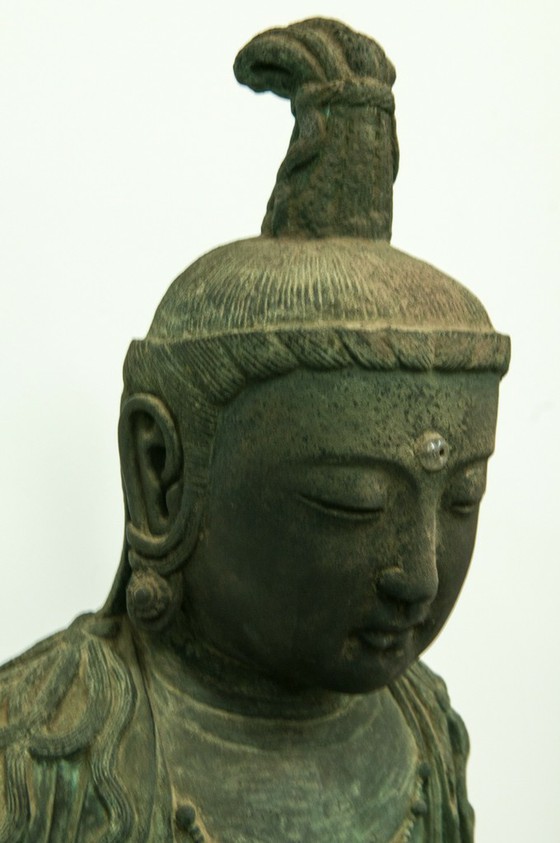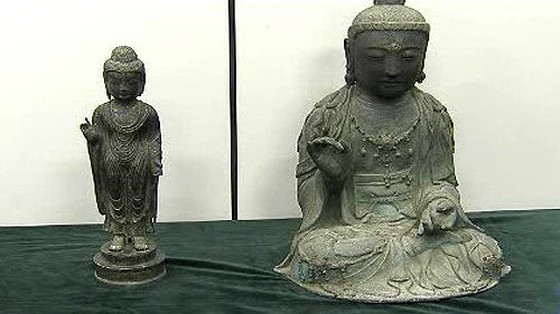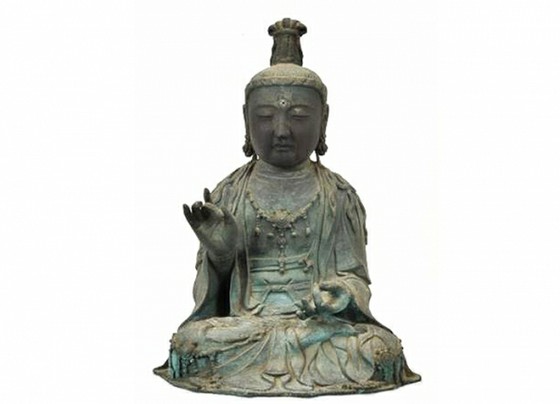   |
In October 2012, a Korean thief entered Japan under the guise of sightseeing in Tsushima, stealing two Buddha statues from a temple and a shrine. They had stolen the Tripitaka, but decided that it was difficult to sell and threw it away. The Buddha statue, which was brought to South Korea through the port of Busan, became a property worth 2 billion won (about 200 million yen at that time) on the Korean black market.
In December 2012, the Korean police, who received an investigation request from Japan, arrested a thief and the Buddha statue was seized by the authorities. The one stolen from "Kaijin Shrine" was later returned to Tsushima, but the other Buddha statue "Koryo Kindoku Kanzeon Bosatsu Statue" stolen from "Kannonji" has been kept in Korea for nine years. Since it was a stolen item, it was expected that it would be returned to Kanonji Temple in Japan, but it was not because the Korean temple "Buseoksa" claimed ownership.
In January 2013, during the process of investigating stolen objects, a "connection sentence" was discovered in the Buddha statue. A "connection sentence" is a document related to the production of Buddhist statues, and is often stored in Buddhist statues. According to this document, the Buddha statue was created in 1330 by Ukiishi-ji Temple in "Ruizhou, Goryeo". Seosan is the area of Seosan, Chungcheongnam-do in central Korea, and Buseoksa is a famous temple that appears in Korean history textbooks.
In February 2013, Ukiishi-ji insisted that it would have been taken to Japan by looting "Wokou" and demanded provisional disposition so that the Korean government would not return the Buddha statue to Japan. This Buddha statue, which should have been returned to Tsushima along with the other one, was still stored at the "Daejeon National Institute of Cultural Properties" and became a fire in the diplomatic friction between Japan and South Korea.
In April 2016, the "request for return to Ukiishi-ji" trial of this proposal began. This trial was the first foreign cultural property proceeding in Korea. In January 2017, a first-instance decision granted ownership of Ukiishi-ji.
Meanwhile, four thieves, including the main criminal Kim, claimed that "we are patriots because they have regained the cultural properties that Japan plundered and brought back." Kim requested a "national participation trial" in a criminal trial saying "I want the Korean people to make a decision" but was sentenced to four years in prison.
In 2017, the Korean government appealed the decision of the first instance, and the second instance is currently ongoing. The Civil Affairs Division 1 (Director: Bak Sung Jun) of the Daejeon High Court in central Korea held a trial yesterday and 15th. The Korean prosecutor's office on behalf of the Korean government has so far claimed that the Buddha statue is "art forgery."
"Art forgery" means a fake work of art. It is disguised as a real "genuine work" in order to sell it at a high price, and has a different meaning from a "replica" whose purpose is to store the "genuine work".
The Korean prosecutor's office claimed that the gold and bronze Buddha statue was "art forgery" because the appraiser had identified it as "art forgery" when the thief entered Busan in 2012 and cleared the customs. If it was "art forgery", the story was easy. Since the Buddha statue is different from the "genuine work" claimed by Ukiishi-ji, the claim is rejected and the Buddha statue is returned to Kanonji in Japan.
However, the appraisal conducted at the customs clearance of Busan Port was incorrect. Since it was a genuine work by the Korean Cultural Heritage Administration, the prosecution had to withdraw the judgment that it was "art forgery" in yesterday's trial.
At the trial yesterday, the prosecution and Ukiishiji were separated in relation to how the trial proceeded. The prosecution insisted that "Kanonji in Japan will participate in the trial to claim clear ownership at the end of last year, so it should be delayed until the Kanonji side participates."
However, South Korea's Ukiishiji side countered, "It is not clear that Japan's Kanonji will participate. We must continue the trial and reach a conclusion."
In the end, the court of the second instance said, "If the intention for Kanonji to participate in Kanonji is not clear until the next trial, the trial will be terminated." The next trial will continue on November 24th at 3:00 pm.
This trial has something in common with the comfort women trial and the recruitment trial. It is a trial that ignores the statute of limitations, and it is a judgment that relies on presumption only when the evidence is lost. Moreover, the judge must be prepared to fall into the "pro-Japanese" under the pressure of "anti-Japanese innocence."
In the first instance, the Korean court said, "There is a record of "Ruizhou, Goryeo" in the Buddha statue, but there is no record of it being relocated to Kannonji Temple in Tsushima." There is a history book saying that it was done, and it is judged that it was carried out by theft or looting, not by gifting or buying and selling."
If this logic holds, "All things written as 'Made in Japan' in Korea are stolen or plundered, not gifted or sold, unless the receipts and other acquisition records are kept for 700 years. The logic that "it is judged to be a thing" is also established.
Whether such a ruling is desirable for South Korea is by no means so. As you can see from the remarks made by the thief, who has 56 criminal records in total for the quartet, "We are patriots" and "Judgment to the Korean people", "Anti-Japanese innocence" Is paralyzed by the ethics of Korean society, and the collapse of the rule of law is occurring everywhere.
2021/09/17 21:07 KST


